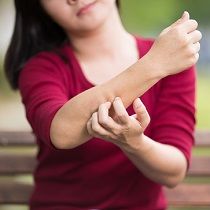Article
New Study May Explain Pollution, Atopic Dermatitis Link
Author(s):
Though air pollution has previously been associated with elevated rates of atopic dermatitis (AD), the reason for that correlation remained mostly a mystery until last week.

Though air pollution has previously been associated with elevated rates of atopic dermatitis (AD), the reason for that correlation remained mostly a mystery. Last week, Japanese researchers announced that they may have identified the reason why bad air can turn into a bad itch.
Published in Nature Immunology, the study from researchers at Tohoku University Graduate School of Medicine used mice to demonstrate that aryl hydrocarbon receptor (AhR), a transcription factor activated by air pollutants, can actually cause hypersensitivity to itch. Its activation led to the expression of a neurotrophic factor called artemin, which has previously been found to be important in the pathogenesis of itching sensations.
“In human clinical samples, high levels of AhR activation and artemin expression are observed in atopic dermatitis patients but not in healthy individuals,” according to a press release from the University.
The itchiness of the affected skin serves as a gateway for allergic pathogens. "Scratching makes things worse because the skin barrier gets disrupted and sensitization to antigens is enhanced. That's why some people are predisposed to atopic dermatitis,” says Dr. Masayuki Yamamoto, one of the researchers.
Just as asthma can be triggered and exacerbated by air pollution, AD is another allergic condition that can be as well. A study of children from South Korea last year showed increased AD symptom severity that correlated with heightened levels of volatile organic compounds indoors, just as outdoor pollutants had been found to.
The researchers behind this new study are hopeful that, by moving the conversation beyond correlation and into an exploration of causation, they can open the door to new treatments for AD. Currently, steroidal treatments are most commonly used to alleviate AD symptoms, but the study suggests looking towards treatments that could inhibit AhR or artemin.
Related Coverage:
Which Emollient Makes Atopic Dermatitis Worse?
Dupilumab, A Promising Atopic Dermatitis and Asthma Drug, Fast-Tracked by FDA
Dermatologists Name Favorite Drugs in Pediatric Atopic Dermatitis




